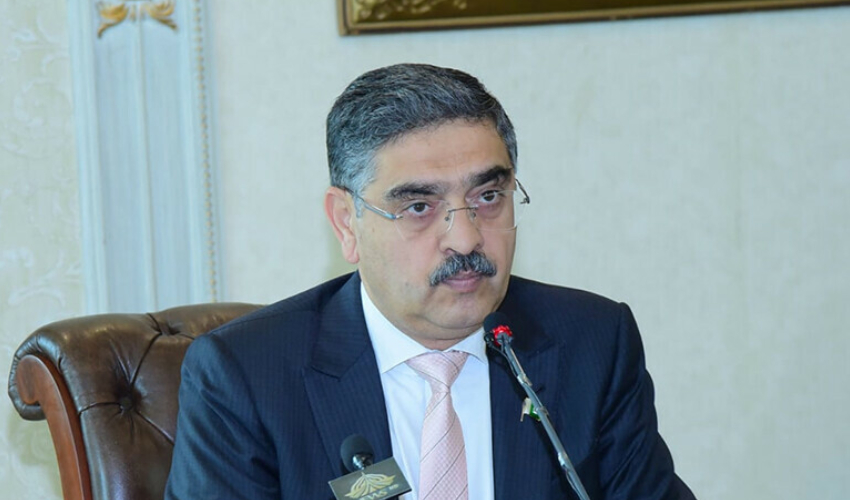Caretaker Prime Minister Anwaarul Haq Kakar urged on Saturday the immediate execution of the US$100 billion commitments for climate finance to ensure the implementation of climate change actions in developing countries.
During the 28th Conference of Parties of the United Nations (COP28), he delivered the National Statement, emphasising that such finance should not impede development finance or add to the existing high debt burden of developing nations.
Prime Minister Kakar called upon developed countries to take the lead in enhancing global mitigation ambitions in proportion to their economic standing and historical responsibility. He urged them to assist developing countries in achieving similar goals.
Stressing the need for global resilience, he advocated for an ambitious outcome in the form of a framework for a global goal on adaptation with clear targets and indicators, including regular progress monitoring. Additionally, he emphasised that at least half of climate finance should be allocated to adaptation.
Expressing high expectations from COP28, Prime Minister Kakar underscored the importance of tangible actions over mere words. He highlighted the urgency of providing adequate means of implementation, including climate finance, capacity-building, and technology, to empower developing countries to address the escalating challenge of climate change.
The prime minister pointed out that Pakistan faced super floods last year, and the current year is projected to be the world's hottest in recorded history. At COP26 in Glasgow, he mentioned Pakistan's increased ambitions with the presentation of the revised Nationally Determined Contributions (NDC), targeting a 60 percent overall reduction in emissions by 2030.
He informed me that Pakistan presented a comprehensive national adaptation plan this year and launched the innovative Living Indus Initiative, demonstrating the country's commitment to climate and nature care. Furthermore, he announced the presentation of Pakistan's first update report during COP28.
Highlighting Pakistan's leadership in establishing a global loss and damage fund last year, Prime Minister Kakar stated that this year's focus was on activating an adequately financed loss and damage fund along with its funding arrangements.
He emphasised that climate justice demanded enabling developing countries to achieve Sustainable Development Goals (SDGs) while contributing to climate objectives, necessitating sufficient additional predictable grant-based climate finance from developed countries.
– Implement climate change actions –
PM Kakar emphasised the imperative of meeting the escalating needs of developing countries to effectively implement climate change actions.
Speaking at the Global Stock Take (GST) event on means of implementation, he underscored that the financial requirements of developing nations far exceeded the unfulfilled US$100 billion pledge.
PM Kakar pointed out that developing countries needed $6 trillion by 2030, even to fulfil less than half of their existing Nationally Determined Contributions (NDC). Highlighting specific financial needs, he stated that adaptation alone required $387 billion annually until 2030, with estimates for loss and damage reaching around $400 billion annually, expected to grow to $1 to 2 trillion by 2050.
The prime minister urged that the outcomes of the GST and COP28 draw attention to the substantial gap between the finance mobilised and the needs of developing countries.
He called upon developed countries to urgently rectify shortfalls and financial commitments under the Paris Agreement, unlocking enhanced support to enable developing nations to bridge implementation gaps in their mitigation and adaptation actions.
PM Kakar stressed the timeliness of GST outcomes in guiding discussions in 2024 on setting new collective quantified goals on finance post-2025, commensurate with the needs of developing countries.
He emphasised the need for reform in the international financial architecture and called for the strengthening of the technology mechanism to scale up the development and transfer of proven climate technologies.
Regarding technology transfer, PM Kakar proposed a focus on key and high-emitting sectors with joint indicators, functioning solutions, time frames, and enabling conditions for implementing green technologies. On capacity building, he highlighted the necessity for support, coherence, and coordination across the UN system to attract private and public investment.
Expressing hope for ambitious outcomes, he underscored the importance of discussions throughout COP in achieving equitable and responsive means of implementation.
The prime minister reiterated the shared goal of ensuring a livable planet for future generations, recognising the acute challenges posed by climate extremes and the critical role of implementation and support in the GST report.
He emphasised that, for developing countries like Pakistan, recurring natural disasters and adaptation needs in sectors such as water, agriculture, urban resilience, natural capital, and human health were of paramount concern.



























